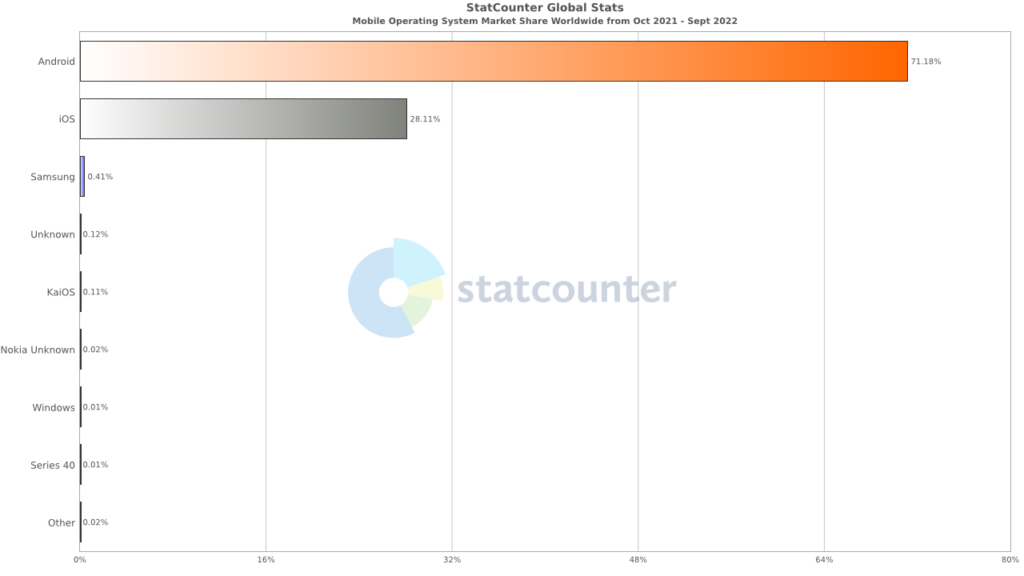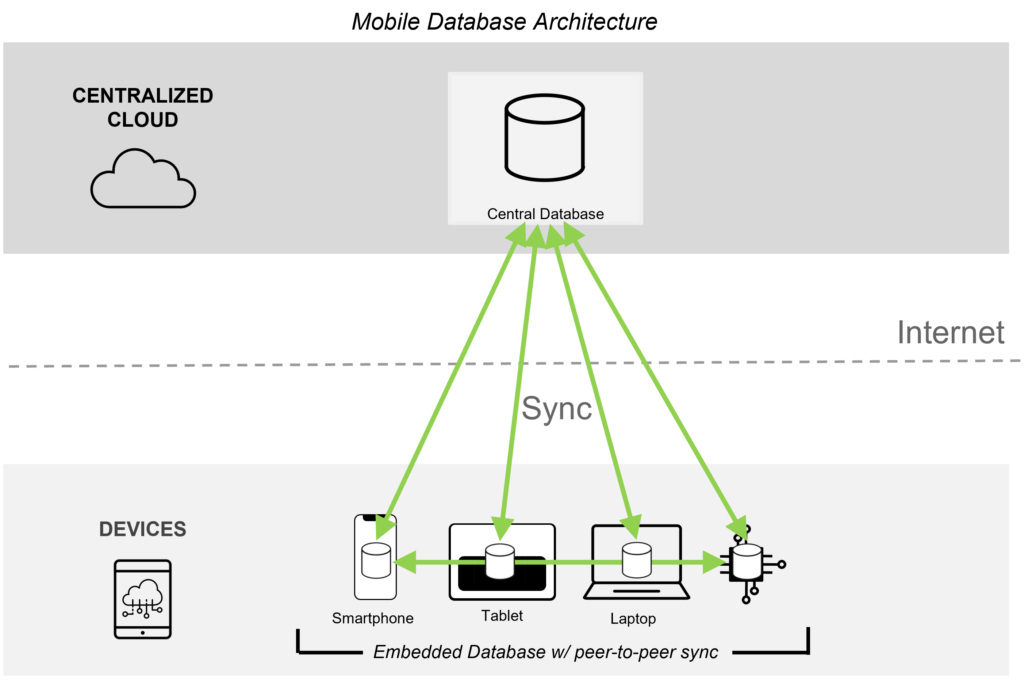Mobile app usage is increasing to an amazing extent worldwide. In fact, TechCrunch recently reported that users now spend between four and five hours on mobile apps every day – that’s nearly a third of most peoples waking hours. And the devices they use overwhelmingly run either Android or iOS operating systems, each with 71% and 28% of the worldwide mobile OS market share respectively, according to StatCounter.

As such, in order to get the broadest possible exposure for your app, you must ensure that you can support both of these platforms at a minimum.
To achieve this, one assumption might be to create a separate native version of the app for each platform using native development languages like Swift for iOS or Kotlin for Android. But building a native app takes time and requires specific skills. So, in order to support both platforms, you have to double the development effort and retain the appropriate expertise to create a native app for each OS – adding up to a considerable amount of time, effort and money. And ongoing app updates only exacerbate the problem, as at least two codebases have to be updated.
In order to reach the broadest user base, how can an app be delivered for multiple platforms at the same time without lengthening the development process and breaking the bank?
This is where mobile cross-platform development frameworks come in.
What is mobile cross-platform development?
Techtarget describes mobile cross-platform development as “the creation of software applications that are compatible with multiple mobile operating systems.”, essentially it refers to development environments that produce native apps for each platform from a single master codebase.
The promise of cross-platform frameworks is “write once, run everywhere”. While this claim comes with caveats, the leading mobile cross-platform development frameworks enable teams to produce an app for both iOS and Android operating systems in a single effort, simplifying the development process and helping get apps to market faster. Further, using a cross-platform development framework also helps ensure a consistent user experience and app feature set across devices, making documentation and support more efficient.
For these reasons, mobile cross-platform development can often be the best strategy to deliver apps for multiple mobile OS’ quickly, especially for organizations with limited resources and a short delivery timeframe.
The importance of a mobile database
Of course when developing mobile apps, regardless of the cross-platform framework you use, you must also carefully consider the database that will power the apps. Users will abandon an app if it’s too slow or fails too often, so speed and availability are critical for success, and using a database built for mobile apps is the way to achieve it.
The mobile database model is made up of an embeddable database running within apps on mobile clients that share data via automatic synchronization with a central cloud database. With a mobile database, captured or changed data is instantly synced between the cloud database and other embedded devices.

When a network connection isn’t available, local data storage and processing on the device ensures that apps stay operational, and when the connection is restored, sync resumes automatically.
This is how mobile apps can provide the highest guarantees of uptime and low-latency – embedded data processing makes sure apps are always fast and oprational regardless of network connectivity, and synchronization enables data consistency and integrity.
As such, when adopting a cross-platform strategy look for a mobile database – with built-in sync – that works with your cross-platform framework.
Couchbase provides a mobile database that brings the power and flexibility of a cloud NoSQL database to the edge. It is ideally suited as a synchronized backend and embedded database for cross-platform apps.
The Couchbase mobile database stack includes:
-
- Couchbase Capella – A fully managed cloud NoSQL database-as-a-service (DBaaS) with support for SQL, search, analytics and eventing.
- Capella App Services – Fully managed backend services for bidirectional sync, authentication and access control for mobile and edge apps.
- Couchbase Lite – An embedded NoSQL mobile database with SQL, search, peer-to-peer sync and broad mobile platform support.
Cross-Platform App Development Frameworks
Thanks to amazing advancements in technology over the past few years, there has never been a better time to adopt a cross-platform development strategy – there are many options and lots of mature tools to help. Here are 4 of the most popular cross-platform development frameworks and how you can leverage Couchbase with each.

Flutter
Flutter is an open source mobile cross-platform framework created by Google in 2017. Flutter developers use a programming language called Dart, which is optimized for building front-end user interfaces. Flutter includes an SDK to compile code into native code for iOS and Android, and a UI library based on widgets, essentially reusable visual components like buttons and text boxes that can be customized for specific layouts and behavior. Flutter is supported by a growing community of developers who swear by its simplicity, speedy compilation, and great documentation.
Flutter developers can leverage Couchbase for their mobile apps by taking advantage of the community-provided and maintained Couchbase Lite for Dart project, which implements Couchbase Lite for Dart and Flutter.
What’s better, Couchbase provides a detailed Learning Path for Flutter on the Couchbase Developer Portal. The learning path provides step-by-step instructions that guide you through the process of embedding Couchbase Lite to Flutter apps and setting up synchronization with Capalla App Services. It makes learning the core concepts fun and easy, and at the end you have a working app to use as a reference for your own projects.
React Native
React Native is a cross-platform framework for developing iOS and Android apps using JavaScript. React Native is based on React, a JavaScript library created by Facebook specifically for developing user interfaces. React Native has a large community of developers who benefit from the simplicity of using JavaScript to create native iOS and Android apps. Of note, Facebook was built using React Native.
You can learn about using Couchbase for your React Native mobile apps here, and be sure to leverage these community provided resources:
These great resources will show you how to use Couchbase for offline data storage and sync in your own React Native apps.
Xamarin
Owned by Microsoft, Xamarin is an open-source platform for building iOS, Android, and Windows apps using .NET. While Xamarin provides the ability to use native code for developing Android or iOS apps, Xamarin.Forms is the specific Xamarin feature that allows developers to create apps for multiple platforms from a single codebase. Xamarin.Forms provides built in UI layouts and visual components that are customizable and easy to work with, and it includes the Visual API to ensure a consistent user experience across iOS and Android apps. Xamarin has a large community and several forums, and developers who work with Xamarin see benefits in faster time to market and lower development costs from a single, reusable codebase.
Learn how to use Couchbase with Xamarin apps in the Couchbase documentation, and be sure to takes advantage of the Developer Quickstart Tutorial on Couchbase with Xamarin Forms, its a great resource for learning how to embed Couchbase to your own Xamarin apps.
Ionic
Introduced in 2013, Ionic is an open source SDK for building native iOS and Android applications using standard libraries and languages including React, Angular, and Vue. Ionic includes Ionic Capacitor, a cross-platform JavaScript native bridge that turns a web project into a native iOS or Android mobile app, and Ionic Framework which provides a library of UI components, navigation, gestures, animations and more. In partnership with Couchbase, Ionic has produced some great resources for getting started with Ionic and Couchbase Lite.
Learn more about using Couchbase in your own Ionic development projects, and be sure to leverage these partner supported resources:
The Couchbase advantage for cross-platform development
Regardless of which cross-platform development framework you use, Couchbase provides the mobile database to make your apps faster and more reliable, delighting your users and helping you stand out in a crowded market. And it works with the top cross-platform frameworks to make your development effort easy and help you get your apps to market faster.
Test drive Couchbase Capella for free today, see for yourself how easy it is to setup sync services and a backend database for your cross-platform mobile apps.